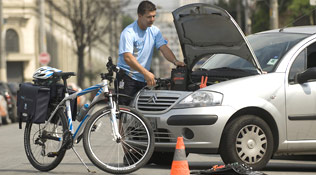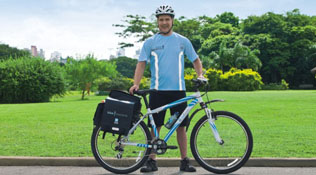SUSTAINABLE COMPANY
Environmental Responsibility
Even though we are essentially a service provider, we also make an impact on the environment. This is why we try to invest in environmental-responsibility initiatives that are directly related to our business, such as Bike Help and Bike Inspection.
However, we understand that this is not enough to build a sustainable world and, therefore, we must find other ways of educating employees. Thus, we promote actions such as the Earth Hour as well as cooking-oil and battery collection campaigns that can raise environmental awareness beyond the organizational environment.
BIKE HELP

Auto insurance policyholders can receive Bike Repair services where simple tasks, which can be performed on-site, are performed by cyclists. This includes changing tires, filling up, recharging batteries, fixing simple malfunctions, among other things. Using bicycles aims to speed up service and contribute to reduced carbon dioxide (CO2) emissions, the main pollutant that is released into the atmosphere by vehicles, such as the tow trucks and vans we use for certain services.
BIKE INSPECTION

Like Bike Help, we replaced cars with bicycles to meet the needs of the auto insurance policyholders in São Paulo that request vehicle inspections at home. With this type of vehicle, service providers improve their quality of life, policyholders speed up the process, and we avoid releasing carbon dioxide (CO2) into the atmosphere. With Bike Inspection, we no longer release 218 kg of CO2 a month on average.
ENVIRONMENT WEEK
We prepared special events to celebrate the Environment Week in 2011. On May 31, we started our activities for employees and service providers with a lecture on Sustainability: Concepts and Values for Our Lives, which was given by Reinaldo Bulgarelli, academic coordinator of Social Responsibility at the Getulio Vargas Foundation of São Paulo (FGV/SP, acronym in Portuguese). On June 2, we conducted the Grow Your Seasoning workshop, an environmental-education effort that teaches you how to reuse materials and grow vegetables at home. On June 5, the World Environment Day, we conducted a public showing of Peter Pan and Pinocchio Save Nature, a children's spectacle that was also a part of the I Sustainable Soiree, which was carried out by the São Paulo Office of Parks and Recreation on June 4-5. The purpose of all these events was to educate attendees about environmental issues in tune with the actions we had already promoted with employees, clients, and partners.
These events took place at our Campos Elíseos headquarters in downtown São Paulo.
EARTH HOUR
On days with good or partially cloudy weather, the lights at the buildings of our headquarters and branches are turned off from 11:30 a.m. to 01:30 p.m. We wish to save power during this period and educate employees about how they can do the same at home. With this simple action, we already saved 532,000 kWh since we implemented this program, which equates to the consumption of 2,900 households in one month.
WATER AND ELECTRICITY CONSUMPTION
Besides the Earth Hour, we adopted other measures to reduce our nominal water and electricity consumption at our buildings. These include setting a fixed time to turn the air conditioner and the lights on and off, replacing incandescent light bulbs with compact fluorescent lamps, educating employees and associates about the best practices in the use of computers, and deploying energy transformation devices, such as capacitors, to correct the power factor and help us save on our energy bill. Newer, more efficient facilities are being built to reduce the air conditioner load. We also want to use solar screens and curtain walls, which have been mostly used in the façades of our buildings for about ten years. We have also been testing LED lamps to save on our energy bill and eliminate pollution and waste.
In addition, there is also a reduction and a pay-as-you-go program where power entry equipment that measures peak and trough levels in consumption and supply voltage from the utility company, including the relative adjustment between capacitive and inductive power. These initiatives have been allowing us to cut our nominal power consumption by up to 26%.
With regard to our water consumption, there are reduction projects that identify supply system issues and improvement opportunities as well as reduced water flows, which are reflected in consumption.
Corporate Consumption Monitoring
Since March 2010, we have been monitoring our water, electricity, and diesel fuel consumption levels at our headquarters. Since we implemented a utility bill management system, we have been building a database to compare the performance of each installation.
Indicators include:
- Power consumption indicator in kWh/m² (kilowatts-hour per square meter of office area);
- Water consumption indicator in L/m² (liters per square meter of office area);
- Water consumption indicator in L per capita / day (liters for each person per day);
- Diesel fuel consumption indicator in L/m² (diesel fuel liters per square meter).
For energy efficiency, our Technical Support Department started a thin-client virtual desktop infrastructure (VDI) project, that is, a process that allows you to run a number of operating systems in a single piece of equipment through hardware sharing. In addition to the 50 terminals we deployed in 2010, we installed another 950 in 2011. This solution allows us to cut nearly 80% of our power consumption levels. We are also gradually replacing cathode ray tube (CRT) monitors with liquid-crystal display (LCD) monitors. Moreover, we have started considering the replacement of diesel generators with natural-gas generators.
COOKING-OIL COLLECTION CAMPAIGN
In 2011, we collected over 4,000 liters of cooking oil at drop-off stations we set up at our branches. We store the cooking oil in plastic and other containers.
All the cooking oil we collect is destined for the preparation of biodiesel, a renewable fuel. Containers are recycled as well.
With this campaign, we try to educate the public about the issues of disposing of vegetable oil in the water. Vegetable oil clogs the sewerage, increases treatment costs, and pollutes rivers and dams. A single liter of oil can contaminate thousands of liters of water.
PLASTIC-CARD AND BATTERY RECYCLING
We provide you with drop-off boxes for plastic cards and batteries at our branches and some repair shops for the appropriate disposal of these materials. All in all, there are 112 drop-off boxes all across Brazil. The materials we collect are ground and sent to recycling companies to manufacture several plastic items, salts, and oxides, which are then reused by the very electronics industry.
In 2011, we collected over two metric tons of waste.
We want to educate our policyholders and the public about the importance of properly disposing of such materials, since batteries and magnetic cards have components that can contaminate the soil when they are tossed in the trash.
WASTE SORTING PROGRAM
Our Waste Sorting Program has properly disposed of 123 metric tons of recyclable waste in 2011, a 75% increase over 2010 due to a program expansion. This increase happened after we installed new waste sorters at the buildings of our headquarters and branches in the greater São Paulo and Rio de Janeiro areas.
ENVIRONMENTAL EDUCATION
In 2011, the Eco Ambiente Portal, which sends social and environmental information to employees and service providers, recorded 2,859 hits. This portal is divided into three sections: At the Company, At Home, and On the Planet. The first one contains information on the efforts employees and service providers can make in the work environment, which range from properly positioning waste in the sorter to reducing the use of resources. In the At Home section, you will find simple tips and tricks that you can use at home. In turn, On the Planet addresses potential movement indicators, expert opinions, and environmental news.
Corporate Mugs
In 2011, we reduced our use of disposable cups by 30%.
This decrease came after we released our collection of corporate mugs, A Toast to Consumption Awareness!, which were available in five models. We distributed over 14,000 mugs.
Fabric Bags
In 2011, we released fabric bags to replace plastic bags. Our employees, brokers, and service providers purchased more than 8,000 bags.
PAPER USAGE REDUCTION PROGRAM
In 2011, we saved over 160,000 paper sheets at our headquarters only. We have been encouraging the use of the back of each sheet for copies, printouts, and drafts. We have published tips and tricks on how to reduce the number of printouts on the Eco Ambiente Portal.
DON BOSCO SHELTER
Since 2007, we have been supporting the Don Bosco Shelter, an organization of collectors of recyclable materials that is maintained by the Salesian Liceu Coração de Jesus school. This shelter aids 57 people and helps them increase their income and improve their quality of life with social-inclusion initiatives. Additionally, it contributes to environmental protection through proper waste disposal. In 2011, 12 meetings were held to strengthen the group and engage shelter users to train them and have them discuss the creation of a future recycling co-op.
GREENHOUSE GAS INVENTORY
In 2011, we continued our efforts to reduce our carbon emissions that we started in 2008, when we made our first greenhouse gas inventory. To this end, we followed the Brazilian greenhouse gas protocol guidelines, the most used tool for this kind of measurement. Inventory results encouraged moves such as the replacement of our fleet with flexible-fuel vehicles and the adoption of ethanol as a standard fuel. This information will be available on www.registropublicodeemissoes.com.br on 5/31/2012.
AUTOMOTIVE WASTE MANAGEMENT
STATEMENT OF PURPOSE
- Eliminate the risk of environmental pollution from hazardous waste coming from the Porto Seguro automotive centers;
- Donate scrap iron to recycling co-ops, thereby generating income, promoting social inclusion, and giving a social and environmental role to the program and the operations of our Porto Seguro automotive centers;
- Handle all hazardous waste (Class I);
- Adjust and standardize the storage and disposal infrastructure to make it environmentally suitable for waste.
In 2011, we purchased two Sprinter vans to expand our Automotive Waste Management Program.
Upon purchasing these vehicles, our collection efforts were extended to 54 Porto Seguro Automotive Centers and other ten repair shops for auto losses. We disposed of over 200 metric tons of scrap properly.
In collaboration with the Vira Lata co-op, this program picks up scrap from Porto Seguro automotive centers, disassembles it, presses it, and disposes of it properly to help protect the environment and avoid the misuse of parts. This initiative also promotes social-inclusion and income generation efforts. On average, almost 70 Vira Lata co-op members benefit from the recycling revenue.
The partnership between us and the co-op started in 2007 after we made a donation of recyclable materials from our headquarters and branches in the Greater São Paulo Area. Automotive scrap has been collected since 2008. We also help the co-op by providing them with administrative consulting services, giving them donations, and purchasing equipment.
SQUARE MAINTENANCE
We have promised to maintain the green areas of six locations in São Paulo:
- The flowerbed at Manoel Monteiro de Araújo Street in Vila Jaguará;
- The David Raw Square near Pacaembu Avenue;
- Carvalho Pinto Avenue in Penha;
- The central flowerbed at Rio Branco Avenue from Eduardo Prado Road to Duque de Caxias Avenue;
- The Princesa Isabel Square and the Largo Coração de Jesus Square in Campos Elíseos;
- The central flowerbed at General Edgar Faccó Avenue in Pirituba.
In 2011, we also started a tree planting project around our headquarters.